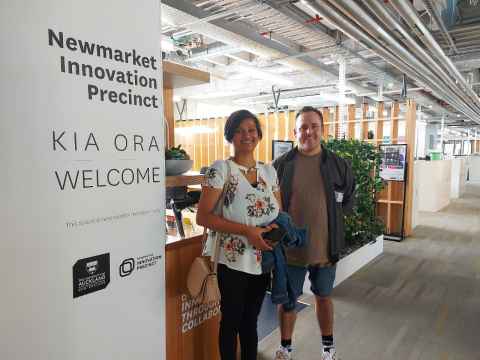Exploratory R&D leads to expansion opportunities through colocation with NIP
1 July 2022
Avertana, a company turning industrial waste into valuable mineral and chemical products, uses the support of the Newmarket Innovation Precinct's to help conduct their research.

New Zealand's steel manufacturing industry produces hundreds of thousands of tonnes of steel annually, which can generate big waste streams. Technologists and entrepreneurs James Obern, Sean Molloy, and Dr Sean Simpson saw those waste streams as opportunities to explore. They founded the company Avertana to create innovative extraction technologies that can turn large industrial waste streams into a global commodity, while reducing environmental impacts.
Avertana’s founding members started with a question:
How does one transform industrial waste streams into useable products?
Obern, Molloy, and Simpson found that the residual slag produced by NZ Steel is rich in titanium oxides. These oxides are valuable and can also be used to produce paint pigments, water treatment chemicals, fertilisers, and more. But Avertana’s slag refinement process required experimenting with new chemistry and developing new concepts. That’s when the company turned to the University of Auckland for help.
In the past, the company hired PhD students from the University of Auckland’s Light Metals Research Centre (LMRC) to conduct its research. The LMRC Director Dr Ron Etzion made a significant contribution to Avertana’s research on heat-treating Magnesium salts and Avertana made a breakthrough after 18 months of experimenting. Now the company is co-located at the Newmarket Innovation Precinct (NIP), conducting their research at NIP Labs and maintaining their research relationship with a range of experts within Engineering and Science.
‘NIP Labs’ are an initiative which allows companies to work shoulder-to-shoulder with University of Auckland researchers in the Newmarket Innovation Precinct’s laboratory facilities. In Avertana’s case, NIP Labs allow the company to use University wet labs and furnace labs, supported by a highly skilled technical capability. NIP Labs are based at the centrally located Newmarket Campus on Khyber Pass Rd.
James Obern, Commercial Vice-President of Avertana, said the laboratory facilities and infrastructure available at NIP would be very difficult for companies like his to access without the NIP Labs initiative. Most new labs need to go through rigorous consent processes to set up industrial plants that work with strong acids and bases, but NIP’s facilities already have those permissions in place. Obern said practising this chemistry in the extensive and purpose-built labs at NIP allowed Avertana to explore and expand on its R&D. NIP Labs allows Avertana to work on a per-project basis, providing Avertana staff with an exceptionally flexible way to explore their options which is crucial to their commercial development.
As Avertana and NIP continue working together, James Obern expressed his wish to see the rise of opportunities for students to work productively alongside industry professionals. The joining of industry and the university in this way would be mutually beneficial by matching immense reserves of talented engineering and science students with the real-world learning experiences usually only available by working in industry settings.